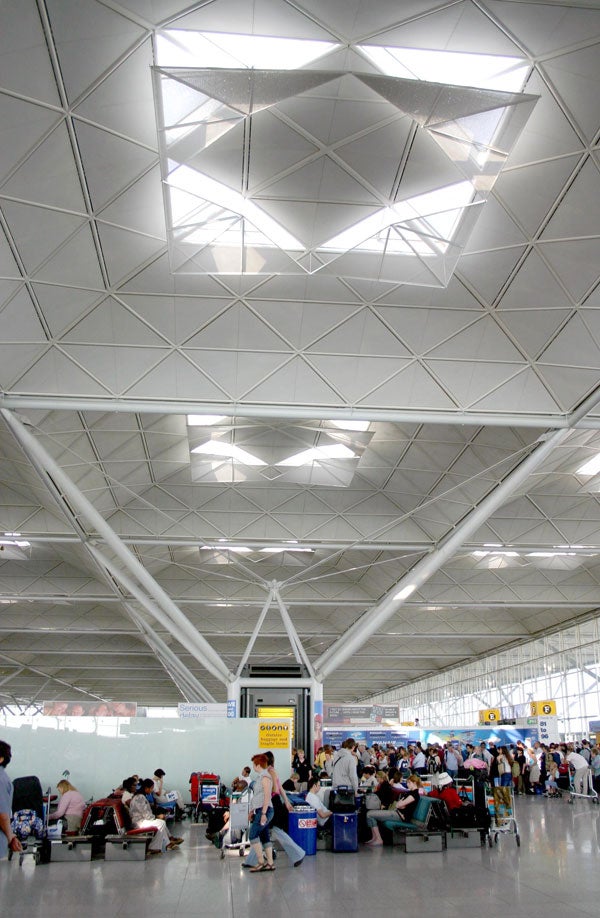Simon Calder: Stansted's six degrees of travel desperation
The man who pays his way

Your support helps us to tell the story
From reproductive rights to climate change to Big Tech, The Independent is on the ground when the story is developing. Whether it's investigating the financials of Elon Musk's pro-Trump PAC or producing our latest documentary, 'The A Word', which shines a light on the American women fighting for reproductive rights, we know how important it is to parse out the facts from the messaging.
At such a critical moment in US history, we need reporters on the ground. Your donation allows us to keep sending journalists to speak to both sides of the story.
The Independent is trusted by Americans across the entire political spectrum. And unlike many other quality news outlets, we choose not to lock Americans out of our reporting and analysis with paywalls. We believe quality journalism should be available to everyone, paid for by those who can afford it.
Your support makes all the difference.As I walked across the car park from the hotel, there it was, shimmering in the pre-dawn sky like some intergalactic space station: Stansted airport. No, I was not sleep-deprived, nor hallucinating. The £68 I spent on the Radisson Blu hotel (booked well in advance through Holiday Extras) bought top-quality slumber – plus a 5am perspective that showed Norman Foster's bright, white creation at its very best.
From outside, Stansted's terminal marks an inspirational beginning to any journey, but once inside, your trip can degenerate quickly because things move so slowly. En route to Spain on Monday morning, every security channel was open, but progress was so slow that I had 25 minutes to observe the six degrees of desperation, Stansted-style.
The first degree of desperation is that slightly breathless search for the shortest line, with frowning passengers calculating which queue offers the best prospects (and perhaps deploying some amateur profiling along the lines of: "They look like business travellers, so they won't hold us up").
Degree number two: jumping the queue. Passengers booked on the earliest wave of flights soon began imploring travellers with less urgent deadlines to let them sneak through to the front of the queue, with resulting bad-tempered "My need is more pressing than yours" confrontations.
The third degree of desperation is displayed by the passenger who removes almost every loose item that he or she is wearing, from spectacles to shoes, aiming to ensure that the metal detector will not be triggered. Murphy's Law means that the alarm will probably sound anyway, because a certain number of "clean" passengers are randomly selected for a search.
Deeper degrees of desperation begin when your bag is picked out to be hand-searched.
The fourth level of anguish arrives with the realisation that, at the current rate of progress, that bag will stay tantalisingly out of reach for another 15 minutes.
"Can you please search my bag first?" asked one anxious woman. "If you miss your flight, you can rebook," was the security official's robotic response.
If you reach the fifth degree of desperation, at least you will travel light: it's when you abandon your possessions to the security staff. While I watched and waited, at least two people decided that catching their flight was worth more than their cabin baggage, and simply left it behind.
Having waited until the last moment to make this decision, they then provide, spectacularly, the sixth degree of desperation: the Stansted sprinters. These are the people who had arrived at the airport well ahead of the latest check-in time, yet who end up racing through the terminal in the hope that the "latest time at gate" on their boarding pass is not enforced.
Why, I pondered, was the pre-dawn peak at Stansted moving so painfully? The cause appeared to be... plastic bags.
The airport used to deploy staff just ahead of the security queue to hand out the regulation resealable clear plastic pouches for liquids. Not any more. Passengers missed planes because security staff were devoting precious minutes to finding infractions to the rules on sealability and transparency, then suggesting the passenger return to the concourse, buy a regulation plastic bag and join the end of the queue. There were no takers.
You may not get wafted to paradise from Luton
Other airports are available instead, such as nearby Luton – which has recently introduced holograms to speed up security controls. A dummy (looking suspiciously like a prototype inflatable stewardess) reminds you to pack your liquids into that clear plastic bag.
But shortly after I made the plane to Spain by the skin of my dientes, I received this message from Holker O'Conner:
"I missed a flight with my family yesterday as we spent an hour and a quarter in the security line at Luton. There were only two lanes open.
"Staff wouldn't let anyone through more quickly unless they went out to pay for fast-track priority. Even this was nigh-impossible due to the pressure of people waiting.
"When we reached the gate the plane was still there, but Ryanair would not let us board. At least 18 other people were denied boarding with us. Some advice, please?"
Sorry, Holker. All I can suggest is that you choose an alternative airport/ airline combination next time. If enough people do the same thing, then life for future passengers may improve.
Join our commenting forum
Join thought-provoking conversations, follow other Independent readers and see their replies
Comments